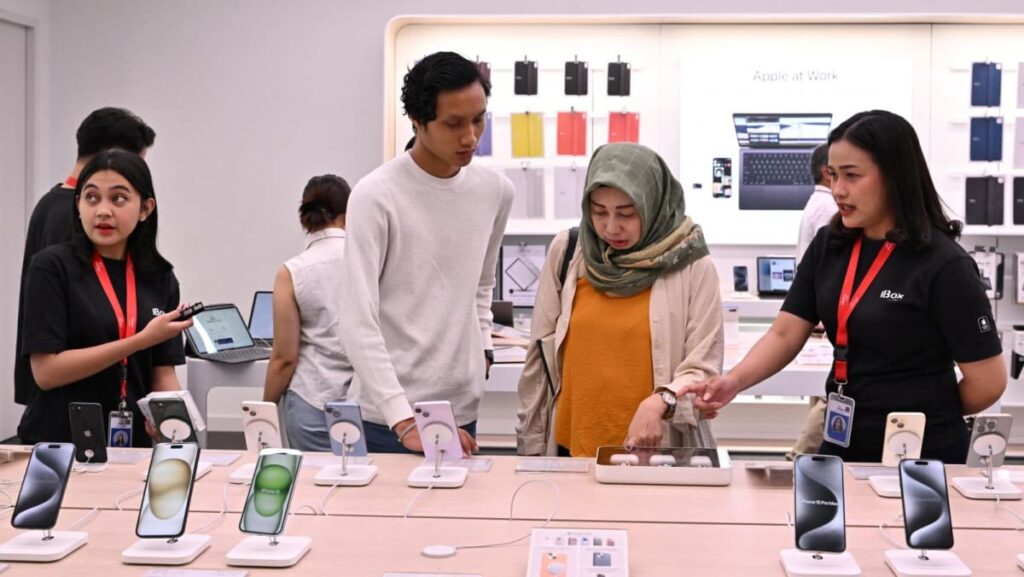SOLVE LOCAL BUSINESSES’ UNDERLYING PROBLEMS, EXPERTS SAY
In recent years, Indonesia has seen a sharp decline in its middle-class population from the effects of the COVID-19 pandemic, which left many businesses and factories shuttered.
Mr Prabowo has promised to create 19 million jobs and the best way to do that, analysts say, is to attract more foreign investments to revive its languishing manufacturing sector.
But forcing companies to invest through the threat of tariffs and import bans is not the way to go, experts say.
After combining its TikTok Shop with Tokopedia, ByteDance reportedly began slashing about 450 jobs at its Indonesian e-commerce arm from June. The reduction makes up about 9 per cent of the arm’s employees, Bloomberg reported.
“To attract investment, policy consistency is crucial. Discriminatory treatment should also not be applied between foreign and domestic investors for whatever policy the government wants to impose,” said Mr Faisal of CORE.
Indonesia needs to upskill its workforce, remove red tape and reduce the cost of shipping goods across the vast archipelago by building infrastructure like ports and roads, he added.
It needs to address the underlying problems that prevent local products from competing with cheap imported goods and protect Indonesia’s MSMEs, which account for 61 per cent of the country’s gross domestic product and employ 97 per cent of the workforce.
“The problems (faced by) SME business actors in Indonesia is not only competition with imported goods but also high lending rates, a fairly high skills gap for SME employees, low quality control and uncompetitive logistics costs,” Mr Bhima of CELIOS said.
“Rather than carrying out baseless protectionism, the government should solve (these) fundamental problems.”
According to the Asian Development Bank, high technology costs and limited financial support have posed a problem for Indonesia’s small business operators.
In adapting to the realities of a global online marketplace where consumers can buy competitively-priced goods from abroad, Dr Siwage from ISEAS-Yusof Ishak Institute said there are opportunities for Indonesia.
Citing the success of local e-commerce platforms Tokopedia and Bukalapak that are now considered “unicorns” – start-ups valued at over US$1 billion – Dr Siwage said the country could create a better environment for more local start-ups to flourish.
“(Indonesia) should design policies and incentives for foreign investors to collaborate with local investors,” he said, noting that Tokopedia’s merger with TikTok Shop could be a business model for other companies.
SOME CONSUMERS BURNT BY iPHONE 16 FRAUDSTERS
The ban on iPhone 16 and Google Pixel phones have so far spurred many to seek the products in the black market or overseas, potentially costing Indonesia millions of dollars in sales tax.
Indonesian industry ministry spokesman Febri Hendri said that as of last month, 9,000 iPhone 16 units have entered Indonesia.
The units were bought overseas and are now being privately used. Mr Febri said his office will make sure that the phones will not be resold and enter the Indonesian market.
The cheapest iPhone 16 is priced at about S$1,299 (US$994) in Singapore, according to Apple. Buyers from Indonesia will have to pay an additional US$155 in import duties if they want to bring the iPhone into their country.
Shortly after the ban on Oct 25, Indonesian e-commerce websites were flooded with people claiming to be selling the new phone.
Mr Febri said the ministry has asked these marketplaces to take down these offers, and many have complied.
“We ask people not to be tempted to buy iPhone 16 from marketplaces and unofficial offline stores. We will take action on any information regarding the selling and buying of iPhone 16,” Mr Febri said in a statement on Nov 1.
https://www.channelnewsasia.com/asia/iphone-16-indonesia-ban-google-protectionism-prabowo-msmes-china-4732951


